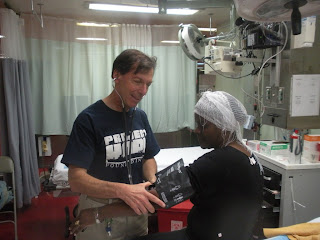 Last week, I sat down with Project HOPE’s on-board medical director, Dr. Harry Knaster, to reflect on the mission in Haiti and take a deep breath before doing it all again in Santo Domingo. Here are some excerpts from the interview.
Last week, I sat down with Project HOPE’s on-board medical director, Dr. Harry Knaster, to reflect on the mission in Haiti and take a deep breath before doing it all again in Santo Domingo. Here are some excerpts from the interview.Dr. Knaster is living his dream on this mission. His career began in Boston, where he provided primary care in a community clinic while working on his master’s of public health degree at Harvard. His plan was to move next to New Zealand and teach epidemiology while pursuing his PhD, but he and his wife decided to stay in the U.S. when they were expecting their first child. He became a residency director in Northridge, California, and later went into private practice in Monterey. Once his children were grown, his wanderlust resurfaced and he began traveling by single-engine plane to Baja California to provide services to remote villages there. When the Indian Ocean Tsunami struck, he journeyed to Aceh and worked in the emergency room of the only remaining hospital facility. He saw the USNS Mercy in the harbor, took a tour of the ship and learned about Project HOPE. Last year, he served as the Project HOPE medical director on the USNS Mercy and visited Port Moresby, New Guinea and several islands in Micronesia.
What attracted you to Project HOPE and your first mission with the Pacific Partnership 2008?
I really liked the philosophy underlying the mission, the idea and expectation of the Navy and NGOs working together to provide a safer and healthier place for people in need.
And so you came back for more of the same on this mission?
I met (Project HOPE's) Dave Eddy and (U.S. Navy's) Captain Ware during the Pacific mission, and enjoyed working with them and knowing that they were dedicated to the same vision as I had formed while on board the Mercy.
Could you describe your duties as medical director?
First, there’s the need to oversee that quality of care is provided and that everyone on the team is doing the job they’re trained/expected to do. It’s also very important to make sure no one is working beyond their physical and emotional capacity. I’m their representative and voice at various levels of decision-making on board as the mission proceeds. And I am also facilitating communication between the caregivers and the non-professional community to insure that care giving needs are being met. And I do some educating when the opportunity is there.
You personally saw hundreds of patients in the six days you were ashore at the clinics in Port-au-Prince, Haiti.
Yes, and I have to say that there has been a major emphasis on this mission in ensuring quality encounters, as well as seeing as many patients as possible.
Did any of your encounters stand out as especially rewarding?
My translator, Joselyn, and I were seeing our last patient at Cite Soleil. She was in her mid-twenties and appeared thin, however, not especially ill-looking. As we had been doing with all our other patients, I introduced myself, as did Joselyn and asked the young woman what was the reason she was seeking medical attention. Her answer was not unlike so many other patients- “I have backache, my stomach aches and I have headaches”. Joselyn and I looked at each other and then looked again at the patient and saw something that didn’t feel right. This woman had something wrong……but we weren’t sure what it was but we both knew it wasn’t related to her initial complaints.We asked some more questions that gave us information about her home life and soon learned that she was the only person cooking, cleaning and caring for at least four other younger siblings and was married to an older man who literally kept her a prisoner threatening her with physical harm if she did not do his bidding. Tears finally came to her eyes as she described her tormented and helpless life. Upon hearing this, Joselyn took out her cell phone and called an agency that protects abused women. She was not able to get through to them, so she took her name and phone number, promising to call her to insure the referral.
Though I do not know the outcome of this encounter, I was fortunate to have the opportunity to work with a bright and empathetic translator who was able to uncover information that would in other circumstances be lost ‘in translation’.
Thanks very much for these insights.





No comments:
Post a Comment